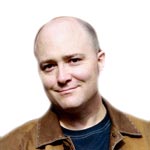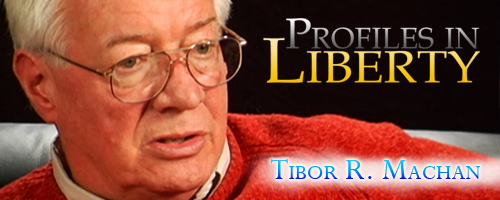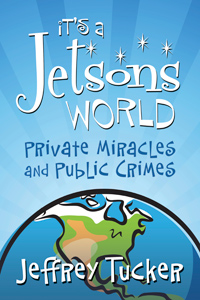From The Daily Bell:
Sunday, March 18, 2012 – with Anthony Wile
 The Daily Bell
The Daily Bell is pleased to present this exclusive interview with Stephen Kinsella (left).
Introduction: Stephan Kinsella is a libertarian scholar and attorney in Houston. The Executive Editor of Libertarian Papers and Director of the Center for the Study of Innovative Freedom (C4SIF), he is Counsel/Treasurer of the Property and Freedom Society, serves on the Advisory Panel of the Center for a Stateless Society and is also a member of the Editorial Board of Reason Papers and of The Journal of Peace, Prosperity & Freedom [Australia]. He was formerly a partner with Duane Morris LLP, General Counsel for Applied Optoelectronics, Inc. and adjunct law professor at South Texas College of Law. Stephan has published many libertarian articles and books including Property, Freedom, and Society: Essays in Honor of Hans-Hermann Hoppe (co-editor, Mises Institute, 2009), Against Intellectual Property (Mises Institute, 2008; Laissez Faire Books edition forthcoming) and the forthcoming Law in a Libertarian World: Legal Foundations of a Free Society and Copy This Book (both Laissez Faire Books). Stephan’s legal publications include International Investment, Political Risk, and Dispute Resolution: A Practitioner’s Guide (co-author, Oxford University Press, 2005), Louisiana Civil Law Dictionary (co-author, Quid Pro Books, 2011) and several other legal treatises published by Oxford University Press, Oceana Publications and West/Thompson Reuters.
Daily Bell: Give us some background on yourself. Where did you go to school? How did you become a lawyer?
Stephan Kinsella: I was from a young age interested in science, philosophy, justice, fairness and “the big questions.” I ended up majoring in electrical engineering at Louisiana State University (LSU). This was the mid-1980s. I liked engineering but over time became more and more interested in political philosophy.
In the late ’80s I started publishing columns in the LSU student newspaper, The Daily Reveille, from an explicitly libertarian perspective. As my interests became more sharply political and philosophical, my girlfriend (later wife) and friends urged me to consider law school. After all, I liked to argue. I might as well get paid for it! I was by this time in engineering grad school. Unlike many attorneys I know, I had not always wanted to be a lawyer. In fact, it had never occurred to me until my girlfriend suggested it over dinner, when I was wondering what degree I could pursue next—partly in order to avoid having to enter the workforce just yet. And also to make more money. At the time I naively thought one had to have a pre-law degree and many prerequisite courses that engineers would lack; and I feared law school would be too difficult. I remember my girlfriend’s chemical engineer father laughing out loud at my concern that law school might be more difficult than engineering.
So I walked across the LSU campus one day and talked to the vice chancellor about all this. He tried to dissuade me, saying that engineering undergrads tended to find law school difficult. But he conceded that a pre-law degree is not needed; all one needs is a BS or BA in something. I took the LSAT and did well enough to get accepted at LSU Law Center. (In the US, law is a graduate degree, the Juris Doctor, which requires an initial B.A. or B.S. degree. Because of ABA protectionism. But I digress.)
I discuss some of this in my article “How I Became A Libertarian,” LewRockwell.com (December 18, 2002), also published as “Being a Libertarian” in I Chose Liberty: Autobiographies of Contemporary Libertarians (compiled by Walter Block; Mises Institute 2010).)
I actually greatly enjoyed law school. Unlike many of my fellow law students, apparently, who seemed in agony. I was free to talk about laws, rules, human action and interaction. Norms and opinions were relevant. I enjoyed the Socratic discussion method. In one sense, it was unlike electrical engineering, which studies the impersonal behavior of subatomic particles. In law, the subject matter is acting humans and the legal norms that pertain to human action. On the other hand, I found it similar to engineering in that it was analytical and focused on solving problems. It is less mechanistic and deterministic than is engineering but it is still analytical. So if you are the type of engineer who can shift modes of thought and who is able to write and speak coherently (not all engineers are), then law school is fairly easy. By contrast, many liberal arts majors are not used to thinking analytically. The first year of law school is meant to break their spirit and remold them into the analytical, lawyer-thinking, problem-solving mold.
In any case, I became a lawyer and do not regret it. It can be lucrative and mentally stimulating. In my own case, my legal career has complemented my libertarian and scholarly interests. As Gary North has pointed out, for most people there is a difference between career and calling. Your career or occupation is what puts food on the table. Your calling is what you are passionate about – “the most important thing you can do with your life in which you are most difficult to replace.” Occasionally they are the same, but often not; but there is no reason not to arrange your life so as to have both. In my case, my various scholarly publications and networks helped my legal career if only by adding publications to my CV. And my legal knowledge and expertise, I believe, has helped to inform my libertarian theorizing.
Daily Bell: You founded your own firm. Tell us how that came about. …
Daily Bell Interview: Stephan Kinsella on the Logic of Libertarianism and Why Intellectual Property Doesn’t ExistRead More »





